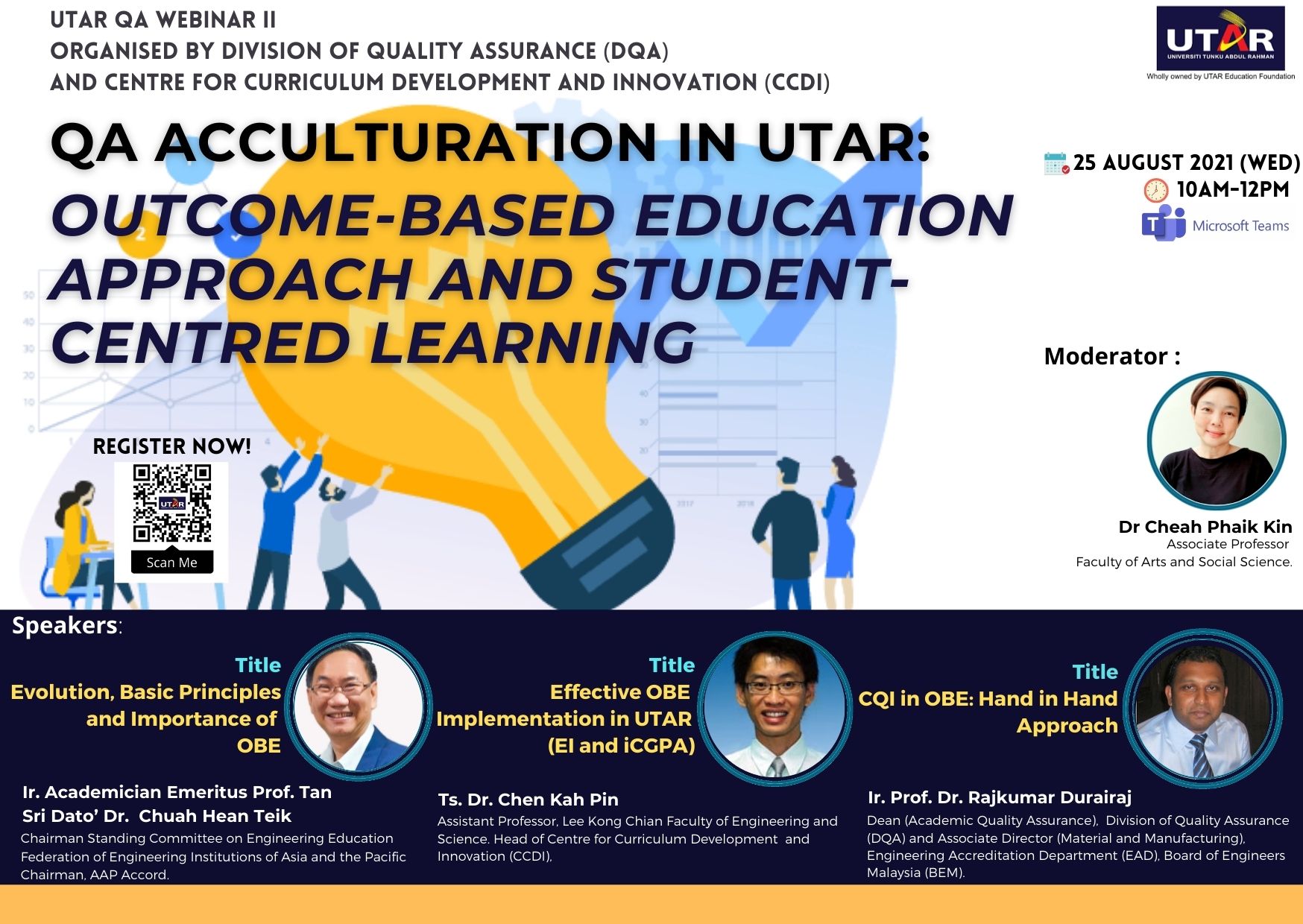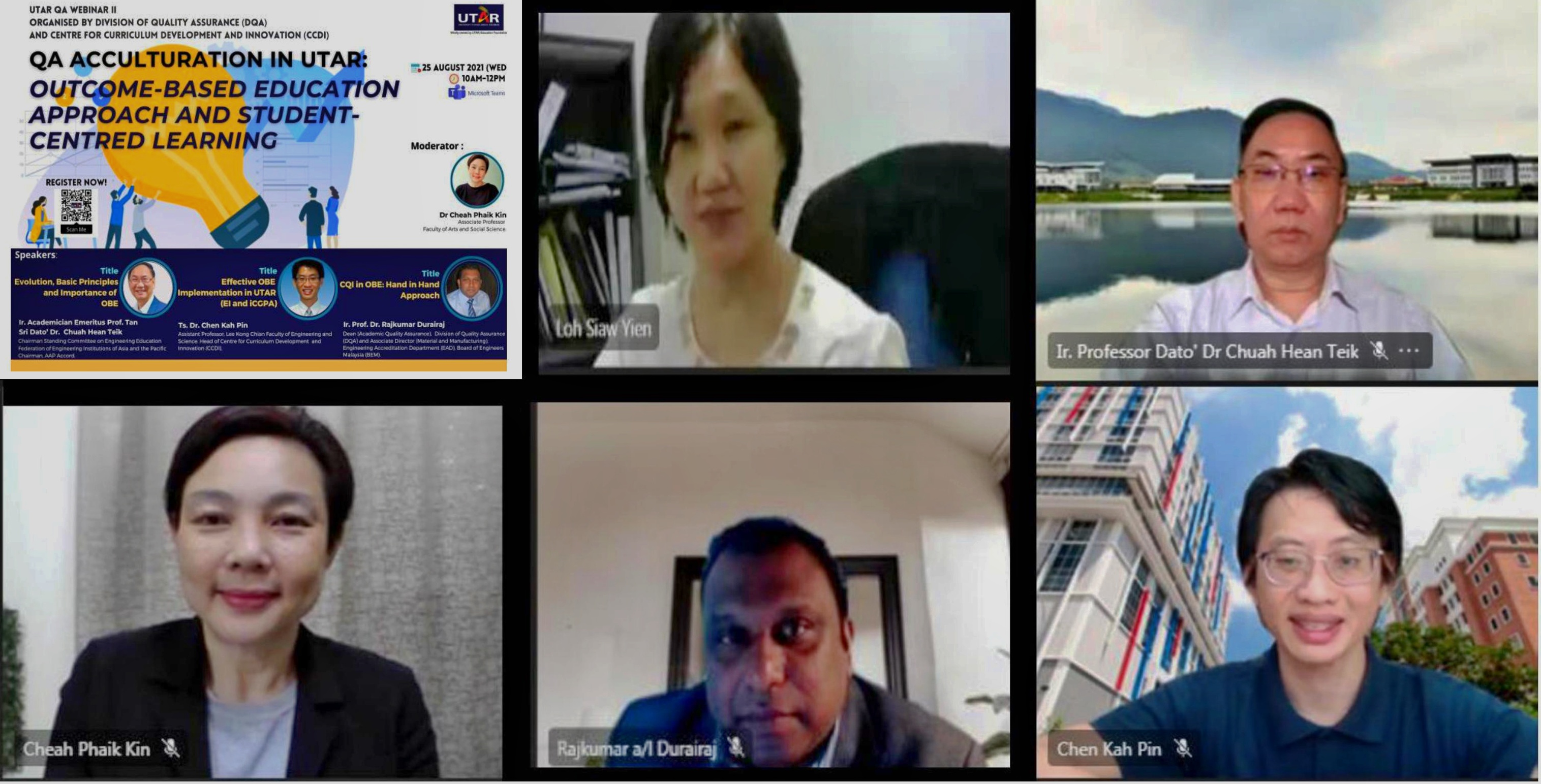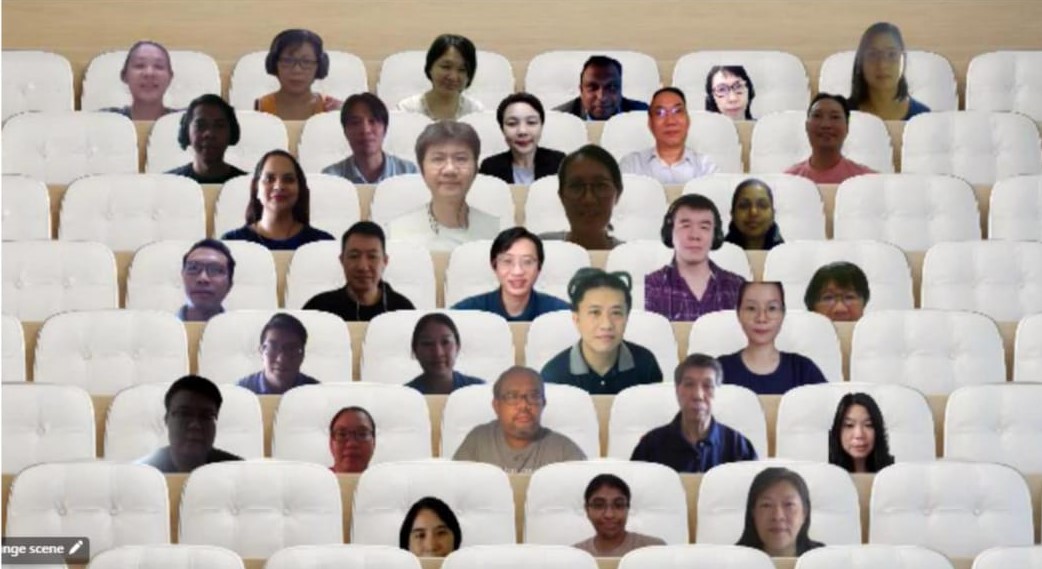

Official poster of the webinar
Set up as a platform to facilitate the discussion on building up Quality Assurance (QA) culture and Outcome-Based Education (OBE) implementation in UTAR, the “QA Acculturation in UTAR: Outcome-Based Education Approach and Student-Centred Learning” webinar was organised on 25 August 2021 via Microsoft Teams.
Invited to enlighten the participants on the topic were Chairman Standing Committee on Engineering Education, Federation of Engineering Institutions of Asia and the Pacific Chairman, AAP Accord Ir Academician Emeritus Prof Tan Sri Dato’ Dr Chuah Hean Teik, Centre for Curriculum Development and Innovation (CCDI) Head Ts Dr Chen Kah Pin and Dean of Academic Quality Assurance Ir Prof Dr Rajkumar Durairaj. The webinar was moderated by Faculty of Arts and Social Science academic Assoc Prof Dr Cheah Phaik Kin. Also present at the webinar were Division of Quality Assurance Director Loh Siaw Yien, staff, and participants.

Clockwise, from the top row, centre: Loh, Prof Chuah, Dr Chen, Prof Rajkumar and Dr Cheah
Speaking first on the “Basic Concepts of OBE” was Prof Chuah, whose sharing enabled participants to understand the basic concepts of OBE, the need for OBE, and current issues of OBE. He firstly defined OBE, which participants understood as an educational philosophy that states education ought to aim at giving students a particular, minimum level of knowledge and abilities as the major educational outcomes. He also listed the five steps involved in designing curriculum as envisaged by John Franklin Bobbitt, which were analysis of human experience (major fields), job analysis (specific activities), deriving objectives, selecting objectives, and detailed planning, before enlightening participants on the basic tasks of an educator.
He spoke on OBE as a paradigm shift in educational philosophy. In traditional teaching, it was teacher-centred, where the teachers owned the knowledge and conveyed it to the students. It was understood that teachers brought the contents and answers into the training room. However, OBE is student-centred and applies modern teaching, where students (trainees) take the initiative to learn. In this new context, the teachers act as facilitators who ask questions and provide guidelines for the acquisition of knowledge.
Prof Chuah explained that OBE focuses on what students can actually do with the following key questions that focus on the students’ outcomes and motivation, delivery and resources that help students to learn and achieve, assessment and evaluation to know whether students have learnt or achieved the intended outcomes and the need for Continuous Quality Improvement (CQI).
He continued, “In the OBE approach, given the more specific nature of its course and programme outcomes, it would be necessary to develop a range of teaching and learning activities that are aimed at achieving these particular outcomes. So, the question to ask as educators is not “What do I want to cover today?” but rather, “What teaching/learning activities do I need to do in order for the students to achieve the intended outcomes?”. Therefore, the approach to OBE is to change the students rather than simply have them learn; helping students to demonstrate a skill or attribute (outcome) that is meaningful and relevant to their present and future career life; taking the back seat in the learning process at times, but remaining in control of the class, and lastly, developing a skill or concept sequentially. With OBE, it helps to develop lifelong learner, a knowledgeable person with deep understanding, complex thinker, creative person, active investigator, effective communicator, participant in an independent world, and reflective and self-directed learner.”
He then elaborated further on the characteristics of OBE curricula and constructive alignment that involved the aspects of learning outcomes, delivery process and assessment. “In a nutshell, OBE identifies programme education objectives (PEOs) and programme outcomes (POs), maps to National Qualification Framework, links to institution’s vision and mission, creates subject course outcome (CO), identifies teaching/learning activities, matches teaching/learning activities to assessments, measures achievement of PEOs/POs and gives feedback for CQI,” explained Prof Chuah.
Participants were advised to be prepared with facing expected changes when implementing OBE, such as curriculum/course content revision, innovative delivery/teaching-learning methods, a variety of assessment and evaluation tools, data and evidence collection, and CQI. However, Prof Chuah assured them by listing some of the benefits of implementing OBE, which were making a more directed and coherent curriculum, producing graduates that are more relevant to industry and other stakeholders, and enabling the practice of CQI. Apart from that, participants also learnt that OBE strengthens educational excellence as it improves international benchmarking external recognition of quality, enables faculty to practise CQI, and gives assurance and confidence to students, graduates, employers, governments, and regional and international employment.
Towards the end of the talk, Prof Chuah highlighted some of the issues faced by educators with the implementation of OBE. “OBE concept is quite new to most universities. The main issue is many still only focus on imparting, assessing and evaluating technical outcomes, without due consideration on non-technical outcomes, thus producing less well-rounded graduates. The current curriculum is also not designed properly to prepare students and graduates towards achieving the POs and PEOs,” explained Prof Chuah.
He added, “Students are also not informed of the levels of achievement of non-technical outcomes, and there is also no documented evidence on the processes of measuring, assessing, and evaluating the degree of achievement of the graduates’ outcomes. Currently, programmes are only reviewed based on a five-year cycle, and CQI is not implemented. There is also no quality system to ensure the achievements of the graduates’ outcomes.” He also highlighted that currently, the quality system tends to be limited to checking on the processes surrounding the setting of examination papers; the security of the examination process and the moderation of the assessment process. But the quality and CQI for OBE should, by right, cover all aspects of education.
On a more practical aspect, the second speaker Dr Chen elucidated on “Effective OBE Implementation in UTAR”. His talk educated the participants on the OBE implementation approaches in UTAR, the importance of EI system for OBE implementation, and the relation of iCGPA towards the holistic development of a student. Participants also learnt that the OBE implementation in UTAR involves several stages, which are planning, implementing, checking/evaluating, and improving. He then spoke extensively on the ways of measuring POs through the teaching/course plan and assessment moderation form.
Further into his sharing, participants were elucidated on the EI system, which incorporates both eOBE2 and iCGPA. “The EI system was previously known as eOBE2 system and it was introduced in UTAR in March 2017. January 2018 saw the pilot implementation of iCGPA for 46 undergraduate programmes via the EI system, while the full implementation was initiated in May 2018 for all undergraduate programmes. In January 2019, the Single Mark Entry was implemented via the EI system to incorporate with the Student Mark Entry System (SMES).
Dr Chen continued elaborating on the applications and usage of the EI system, which also saw participants understanding about the programme configuration, course configuration, assessment configuration, mark entry, CLO attainment report, and PLO attainment report. He then taught participants the method to measure CLO and PLO. On measuring PEO, Dr Chen described the types of indicators used to assess and the weightage associated with the indicators.
Participants were also given in-depth insights on the aspect of iCGPA, which they understood as a system or mechanism for assessing and reporting learners’ integrated developments and learning gains of their ADAB (ethics and values (affective)), their declarative and functional knowledge (cognitive), and their disciplinary skills and technical abilities (psychomotor).
“iCGPA benefits various parties. For the students, it enables continual improvement through academic and co-curricular activities. Lecturers will be able to continuously improve their instructional approaches as they continue to monitor students’ developments. In programme management, iCGPA allows for the continual monitoring of the effectiveness and impact of curriculum design and delivery, as well as enabling intervention programmes for students to achieve optimal performance. Meanwhile, education institutions will be able to apply continuous holistic improvement of institutional ecosystem in developing holistic students and employable graduates,” explained Dr Chen. He also listed some of the training available to help educators on implementing OBE.
Prof Rajkumar enlightened participants on “CQI in OBE – Hand-in-hand Approach”. He began by explaining the quality concept of higher education, which incorporates quality management in higher education institutions, quality improvement and enhancement, quality assurance, and quality control. In the aspect of Continuous Quality Improvement (CQI), Prof Rajkumar explained that the process involved improving the curriculum, planning the outcomes, implementing it in the teaching and learning process, and assessing the course programme to achieve optimal outcomes.
He also spoke about the Code of Practice for Programme Accreditation (COPPA). The principles of COPPA consists of several elements, including organisation, alignment, formality, engagement, reflection, and enhancement. As part of the requirement of COPPA, the mechanism for Programme Monitoring, Review (PMR) and Continuous Quality Improvement incorporates policies that are used to monitor and review the programmes. The review involves all strategic stakeholders, frequency and mechanism for monitoring and reviewing and how the department utilises feedback from a programme monitoring and review exercise to further improve the programme.
“Programme monitoring enhances the quality of student experience. It also enables the institution to identify key issues related to academic standards, the quality of student learning experience, and programme design and content. It also allows for the analysis of issues raised in student performance data, internal student feedback and external surveys. Programme monitoring also ensures the sustainability of the programme and looks into employability issues or generic skills. From the monitoring done, it will be able to provide a continuous review, identify areas for improvement, take appropriate and timely actions, enable reflection, and strengthen knowledge management,” explained Prof Rajkumar.
With teaching and learning now online, Prof Rajkumar emphasised the need to collaborate with internal stakeholders such as lecturers, students, and management, as well as external stakeholders, such as industries, employers, external examiners, accreditation bodies, and directives from the ministry. He explained that collaboration with the stakeholders enables the programme to identify the latest knowledge development of the discipline, and with the needs of society. Towards the end, Prof Rajkumar mentioned that the PMR and CQI strategy, if implemented well, can embed a strong culture of quality within the faculty.
The webinar then ended with an interactive Q&A session.

Speakers and participants at the end of the webinar
© 2021 UNIVERSITI TUNKU ABDUL RAHMAN DU012(A).
Wholly owned by UTAR Education Foundation (200201010564(578227-M)) LEGAL STATEMENT TERM OF USAGE PRIVACY NOTICE